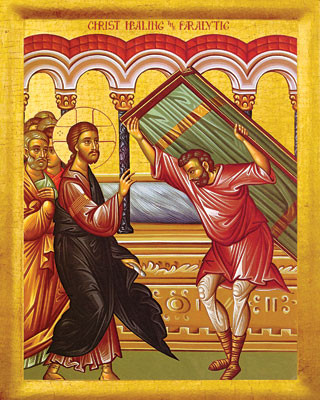Sunday of the Paralytic 2016

I said earlier to the kids that the statement by the paralytic that he has no one to help him is both an important and a heart-wrenching statement.
The question that comes before this is perhaps even more important for each and one of us individually, because Christ asks the paralytic, as he does a couple of times in his ministry: "Do you want to be healed?" There's no evidence anywhere else in the Bible or in Tradition to say that the paralytic was somehow enjoying the state of disability, but it's possible to become comfortable where we are, even in a state of illness, in a state of sin: we become comfortable with it. It's just what we're used to, and it doesn't take that much work to keep the status quo. So if we are asked, "Do you want to be healed?" it is easy for us to stop and say, "Well, I'm not sure."
This is part of where this paralytic is an example for us, because he doesn't say that. He tells Christ the situation, and, yes, he desires that healing. This getting stuck, getting paralyzed, if you will, in a place that is comfortable, even if it may not be the right thing, can happen to us as people and it can happen to us as a community. So we need to look at where we are in our lives. We need to always keep an open mind and an open heart to the Gospel, to what we are called to become by the grace of God, again, both as individuals and as a community.
It is, like I said, easy, and I guess it is natural if we take the fallen human nature to be "natural," for all of us to want to be comfortable, to get to a place where we can say, "Okay, I've gotten here. I don't need to struggle any more." Yet, we know that life here on earth is struggle—against sin, against human nature, against the principalities and powers of this world as St. Paul tells us—to our very last breath. It takes courage, it takes grace, it takes faith, and it takes the support of one another for us to be able to break out of that pattern and to be able to come to Christ and say, "Yes, Lord, I want to be healed. I want to escape from the paralysis in which I find myself. I want to become holy as you are holy."
It is a challenge that this gospel places before us every year: to look into our hearts and see. Do we really want to be healed? Are we willing to do everything that we can do on our part? God will do his, but are we willing to open the doors of our heart, the doors of our mind, for him to enter, to transform us? Again, in one of the prayers of thanksgiving for holy Communion, it says that we receive the Holy Body and Blood "for the illumination of the eyes of our hearts, [...] and the granting of divine grace." Are we willing to be transformed, even if it is uncomfortable, because we trust or we believe that what God has promised us truly is the better thing, regardless of what it is compared to?
So today, on this feast of the paralytic—of the healing of the paralytic—let us believe that God will indeed heal those who desire to be healed. Let us have faith that he will give us what we need for our salvation, even if, sometimes, as hard as it may be, our illnesses and difficulties may be for our salvation. I don't know; I cannot see through everything. By God's grace, and glory be to him and thanks be to him, I'm not clairvoyant. But sometimes the difficulties and trials in our life are for our salvation. Let us trust that as we are struggling against sin, that God will give us the grace and the strength to continue that struggle until, again, by his grace, we can overcome it.
So as we take stock of that, let us marvel at his love and his grace and his patience and the fact that he comes and that he came and continues to come for our salvation, for the healing of souls and bodies. And for all the glimpses that he has given us of the kingdom in his mercy, for all the miracles that he has shown, and all these miracles that take place around us and maybe even in our own lives if we stop and look at how things came together and how things have changed—let us look at all those things. Let those strengthen us in our faith and in the glory and thanksgiving that we give to the Father and the Son and the Holy Spirit.
Labels: sermon

